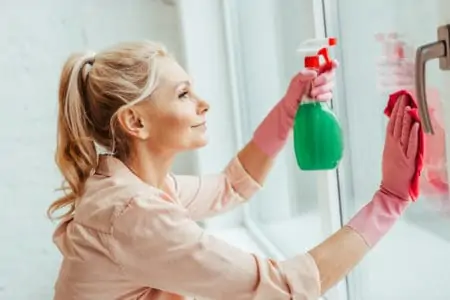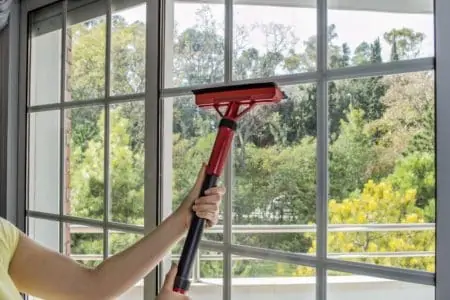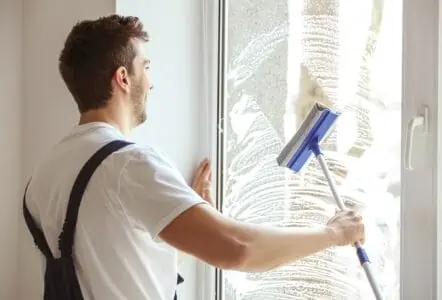Store-bought window cleaners can be full of toxic chemicals and also really expensive over time. If you want to save money and go totally green, then you might want to consider making your own homemade window cleaner.
We’ve put together four different recipes so you can try a few before you find your new favorite method for cleaning the windows and achieving a streak-free finish.
You never know; one of these may be just the thing you pass down to your grandkids!
Key Takeaways
- Make your own window cleaner to save money and avoid harmful chemicals.
- Try different recipes, such as vinegar and dish soap, fragrance-free, hydrogen peroxide, or rubbing alcohol cleaners.
- Use microfiber cloths and Z-shaped patterns for streak-free results.
- Avoid cleaning windows on sunny, windy, or rainy days to minimize streaks and water spots.
How to Make Homemade Window Cleaner
Let’s dive into our top recipe suggestions! If you don’t like one, you can always try another.
Fragrance-Free Cleaner
This DIY glass cleaner takes a couple of minutes to make. Plus, it involves ingredients you probably already have and may work even better than store-bought options.
- Boil one cup of filtered water.
- Use a funnel to add ½ tablespoon of cornstarch into a spray bottle.
- Add the boiled water.
- Put the cap on the spray bottle and shake to dissolve the cornstarch.
- Now add ⅛ cup of rubbing alcohol. The higher the percentage of isopropyl, the more effective the cleaner will be. The rubbing alcohol helps the glass dry faster and prevents streaks.
- Add ⅛ cup of distilled white vinegar. The acidic vinegar can break down the film on windows, glass, and mirrors.
- Cap the bottle and shake well. Now it’s ready to use!
Another Detail
This should last for a few months. The alcohol and vinegar act as a natural preservative.
Vinegar and Dish Soap Cleaner
Vinegar is great for removing the dirt and film that coats many windows. Dish soap also removes grease and grime, so this combination is pretty powerful at eliminating the buildup on windows. Plus, you can add essential oils if you want this window cleaner to be scented.
- Mix ¼ cup of distilled white vinegar, ½ teaspoon of dish soap, and two cups of water into a spray bottle. Shake to mix.
- Add 10-15 drops of your favorite essential oils (optional). Shake to combine.
- The mix is ready to use!
Top Tip
If you don’t have distilled white vinegar, swap it out for ¼ cup of lemon juice. Lemon juice is also great for removing grease and grime. Just note that the spray won’t last as long when using lemon juice.
Hydrogen Peroxide Cleaner
Hydrogen peroxide is a great household cleaner because it’s an antimicrobial and oxidizing substance (1). When using around the house, make sure you get the safe three percent solution.
- Mix ½ cup of hydrogen peroxide and 1.5 cups of water in a spray bottle.
- Shake well to combine.
- Before using on glass, remove any big smudges with rubbing alcohol on a cotton pad. Then use your hydrogen peroxide spray as normal.
Rubbing Alcohol Cleaner
This super simple recipe involves water, rubbing alcohol, vinegar, and essential oils if you’d like them. It’s straightforward to make and takes only a minute once you have your ingredients.
- Make a 1:1 solution of water and rubbing alcohol in a spray bottle.
- Add two tablespoons of distilled white vinegar.
- Add 10-15 drops of essential oil if you’d like.
- Shake to combine.
Tips for Cleaning Windows
Even if you have the best window cleaner in the world, you can still end up with streaky windows if you don’t know the proper etiquette. Here are some fool-proof tips for achieving sparkling clean windows:
- Choose the right cloth: We highly recommend using microfiber cloths for cleaning windows, glass, and mirrors. Microfiber cloth is highly absorbent, super soft, and will leave a lint-free finish.
- Z-Shaped patterns: Wipe in z-shaped patterns to ensure you don’t miss any spots.
- Let windows dry: Before deciding whether there are streaks, let the windows dry fully. You may notice that the streaks evaporate with moisture. If there are streaks after, repeat the cleaning process.
- Never rinse: Never rinse your windows after cleaning them. Cleaning windows with just water will definitely result in streaks.
- Try a squeegee: For a professional finish, combine your DIY window cleaner with a squeegee. This is a great way to eliminate the risk of streaks.
FAQs
Wonderful Windows
Even professionals often recommend creating your own window cleaner solution. Store-bought options are full of chemicals and can be costly over time. Plus, this way, you can cut down on plastic packaging.
Our four recipes are made with eco-friendly ingredients that you probably already have in the house! So next time you go to clean your windows, spend a few minutes making one of these solutions and see what you think.









